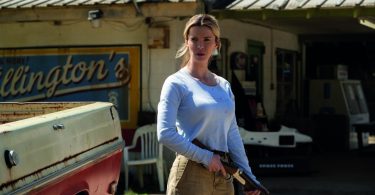With the upcoming release of Macbeth starring Michael Fassbender, here are 5 more Shakespeare adaptations in no particular order:

image: Criterion
Richard III (1955)
“Now is the winter of our discontent made glorious summer by this son of York.” To see Richard hobble towards the camera stooped and deformed, to hear those bitter words uttered with such lucid power and coupled with that hard, steady glare – it’s enough to know this is no ordinary play.
With the relatively recent discovery of Richard III’s remains in a parking lot and the upcoming portrayal of Benedict Cumberbatch in The Hollow Crown (2016), this particular play is placed under limelight. One of Olivier’s most notable performances and with a star-studded cast of John Gielgud as Clarence, Ralph Richardson as Buckingham, Cedric Hardwicke as Edward IV and Stanley Baker as the Earl of Richmond, this adaptation of Richard III is a must see.
They say all actors love to play a villain and Olivier as Richard manages to be both stirring and hate-inducing, intimidating and entertaining – often all at once. The ultimate teacher of treachery, he announces his ability to ‘add colours to the chameleon and set the murderous Machiavelli to school.’ He makes no secret to the audience of his villainous plans (and let’s face it, we all love a good villain). In fact, he tells us. Directly.
One particularly interesting use of cinematography in this adaptation is Olivier’s delivery of Richard III’s wickedly eloquent sarcasm right at the camera. It is almost unnerving as he stares with his unwavering gaze. Unsettling as we, the audience, are given privileged glimpses behind his carefully constructed schemes. Yet, we are in truth, caught, trapped in his sly wit and devious cunning. ‘Thus he doth implicate us, and render us accomplice!’

image: AllMovie
Romeo and Juliet (1996)
Directed by Baz Luhrmann and starring Leonard DiCaprio as Romeo and Claire Danes as Juliet, Shakespeare is given a Hollywood makeover.
From the famous opening lines of ‘Two Households both alike in dignity…’ splayed across the T.V. screen announcing the two protagonists’ tragic ends, the viewer is immediately whisked away into the Luhrmann’s world where gang culture pervades ‘Verona Beach’, gun-wielding teens dominate the city and two rival corporate dynasties are at each other’s throats. Uttered in the distinctive voice of Shakespearean verses.
But it is not only our two main characters that holds the spotlight. Harold Perrineau as Mercutio brings not only diversity but comic hilarity to the cast. With loud music blasting from his car speakers, he enters donning red lipstick, a white wig and pink heels. The epitome of wild recklessness. He then proceeds to lead the Montague boys in crashing the glitzy Capulet party where the fated meeting of our two doomed protagonists will occur. John Leguizamo shines as the wily Tybalt and when these two characters meet, all hell breaks loose.
The music is loud. The scenes frantic. The days flash by in a blur of gunshots. Fitting for a play that occurs in a matter of three days. With vivid sets, loud, boisterous music and religious imagery, Luhrmann’s adaptation injects new life into a well-known tale.

image: AllMovie
10 Things I Hate About You (1999)
With the plot of the horribly titled The Taming of the Shrew, this adaptation is set in Padua High School, where students are divided by cliques, everyone is pre-occupied by thoughts of prom and parties fill nights with music and booze. We see Julia Stiles as a spirited feminist who sneers at conformism and the idiocy of teen-age social life and her sister, the perky and popular Bianca (Larisa Oleynik). Joseph Gordon-Levitt is the new student, Cameron, who becomes completely infatuated with Bianca (‘I burn, I pine, I perish’, seems appropriate, right?) and Heath Ledger as the resident ‘badboy’, Patrick Verona, who is hired to ‘tame’ Kat – but end up genuinely falling for her in the process.
The plot may be predictable and cliché, but you will hear yourself shouting curses as the lies unravel because you actually wanted the two protagonists together. Much of the film’s success is rightly owed to its leads and if you want a light-hearted romance comedy, with a believable mismatched couple oozing with chemistry and funny one-liners, then this movie is a must see.

image: AllMovie
The Tempest (2010)
Here, the central role of Prospero – an exiled Milanese Duke who plans on using magic to restore his reputation – has been recast as the female Prospera (Helen Mirren), adding a new, intriguing dimension to this Shakespearean tale. What’s interesting is that it makes sense – women who acted independent and did not conform to conventional ideas of femininity were often accused of witchcraft in patriarchal societies during this time.
Directed by Julie Taymor, a mother-daughter relationship laden with protectiveness and identification blooms into something enthralling. Mirren emphasizes the character’s need for affection but also her wilful loneliness and Felicity Jones as Miranda is both charming and unworldly – a softer version of her ardent, wise mother.
It’s always interesting to see how a slight change in a classic tale (in this case changing the gender of the protagonist) affects the overall dynamic of the whole story and Taymor’s The Tempest offers just this and more.

image: AllMovie
Coriolanus (2011)
In Ralph Fiennes 2011 adaptation of Shakespeare’s Coriolanus, grenades and AK-47s replace swords, and graffiti lines crumbling walls. Set “in a place calling itself Rome”, contemporary parallels are integrated so effectively that it almost seem natural.
It is perhaps amusing to see Jon Snow himself spouting Shakespearean verse, delivered in the distinctive intonations of a newscaster, on Fidelis TV. We see Coriolanus and Lartius discussing battle plans through a video call and Aufidius (Gerard Butler) holding a worn copy of PRAECLARUS with a portrait of his nemesis at the front cover, looking aesthetically similar to the TIME magazine. Ilan Eshkeri’s beautifully haunting composition will continuously prowl scenes and the sound of drums will echo with increasing intensity carrying with it a sense of foreboding.
This adaptation’s strength lies not only in its visually-striking cinematography (the image of Ralph Fiennes’ scarlet streaked face will etch itself in your memory), but also in the actors’ thrilling delivery of verse. The husky undertones of Vanessa Redgrave’s voice as Volumnia over scenes of a muted battlefield, uttering ‘Come on you cowards’ will send shivers down your spine. While Jessica Chastain as Coriolanus’ wife, Virgilia, remains quiet in the background – Coriolanus calls her ‘My gracious silence.’ Gerard Butler as Aufidius with his voice a growl, face battle-worn and caked with mud and blood appears perfect for this role.
John Logan, known for his work on Gladiator, sharply cuts the original play, removing the more obscure scenes. However, it is precisely this that gives this adaptation the desperation and drive it needs. Along with Barry Ackroyd’s distinctive cinematography that brought about The Hurt Locker, the documentary-style verisimilitude brings Coriolanus to life, closing a four-hundred year distance with ease.
With a strong cast, visceral cinematography and evocatively delivered lines, Fiennes’ directorial debut succeeds in preserving Shakespeare’s last tragedy, whilst making it accessible to the contemporary audience.








